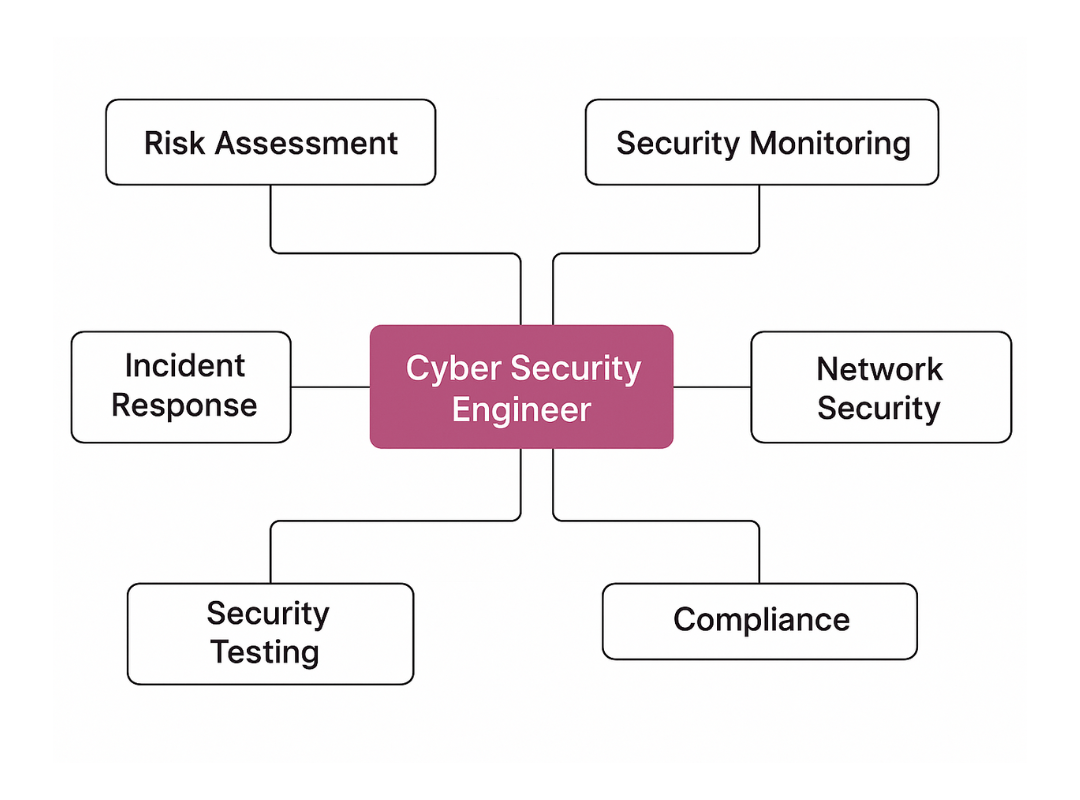The Role of a Cyber Security Engineer: Safeguarding the Digital Frontier
In today’s hyper-connected world, the threat of cybercrime looms large over every organization. As businesses rely on digital infrastructure, the demand for professionals who can defend against cyber threats has soared. One of the most vital roles in this digital defense strategy is that of the Cyber Security Engineer.
This article explores the responsibilities, skills, tools, and future of a cyber security engineer, providing a detailed understanding of their role in today’s digital ecosystem. It also highlights how international frameworks like the NIST Cybersecurity Framework and certifications like CISSP by ISC² define standards for effective cyber defense.

Table of Contents
What is a Cyber Security Engineer?
A Cyber Security Engineer is a professional responsible for protecting computer systems, networks, and data from malicious cyber threats. This includes designing and implementing secure network solutions, monitoring for vulnerabilities, and responding to security breaches.
These engineers operate as the digital guardians of organizations, continuously analyzing risks and proactively fortifying systems to mitigate threats.
Key Responsibilities
A cyber security engineer’s duties extend across a wide range of security operations:
Design and Implementation of Secure Systems: Develop network architectures and security frameworks that are resilient to attack.
Risk Analysis and Mitigation: Identify vulnerabilities through assessments and take corrective actions.
Intrusion Detection and Response: Monitor systems in real time and initiate incident response procedures.
Firewall and Security Protocol Configuration: Manage firewalls, encryption protocols, VPNs, and secure access systems.
Compliance Management: Ensure systems comply with regulations like GDPR, HIPAA, and ISO 27001.
Security Testing: Conduct penetration testing and ethical hacking to simulate real-world attacks.
Incident Reporting: Document breaches, analyze attack vectors, and recommend improvements.
Key Responsibilities of a Cyber Security Engineer

Required Skills and Qualifications
Becoming a proficient cyber security engineer requires a mix of technical acumen, problem-solving ability, and ongoing learning.
Essential Technical Skills:
Network protocols (TCP/IP, HTTP, DNS)
Operating systems (Linux, Windows)
Firewalls and VPNs
Intrusion Detection Systems (IDS) and Intrusion Prevention Systems (IPS)
SIEM tools (e.g., Splunk, IBM QRadar)
Scripting (Python, Bash, PowerShell)
Cloud security (AWS, Azure, GCP)
Soft Skills:
Analytical thinking
Communication and reporting
Attention to detail
Crisis management and decision-making under pressure
Educational Background:
Bachelor’s degree in Computer Science, Information Technology, or related fields
Advanced degrees (optional but beneficial)
Tools and Technologies Used
Cyber security engineers work with a broad array of tools designed to defend, detect, and respond to cyber threats:
| Tool Category | Example Tools | Purpose |
|---|---|---|
| SIEM Tools | Splunk, LogRhythm, AlienVault | Aggregates and analyzes security logs |
| Network Monitoring | Wireshark, Nagios | Tracks network traffic and anomalies |
| Vulnerability Scanners | Nessus, OpenVAS | Identifies weaknesses in systems |
| Endpoint Protection | CrowdStrike, Symantec | Secures devices at the user level |
| Penetration Testing | Metasploit, Burp Suite | Simulates attacks to assess defenses |
| Cloud Security Tools | AWS Security Hub, Prisma | Monitors and secures cloud environments |
A Day in the Life of a Cyber Security Engineer
A typical day might involve:
Reviewing security alerts and logs
Conducting vulnerability scans and patching software
Updating firewall and access control rules
Participating in meetings with IT and management
Educating staff on best security practices
Responding to or investigating any suspicious activity
Cyber security engineers must remain vigilant and adaptable—each day brings new challenges and threats.
Career Path and Certifications
Many cyber security engineers begin as IT specialists, network engineers, or system administrators before specializing in security.
Recommended Certifications:
CompTIA Security+: Entry-level foundational certification
Certified Information Systems Security Professional (CISSP): Advanced-level industry standard
Certified Ethical Hacker (CEH): Focuses on penetration testing and ethical hacking
GIAC Security Essentials (GSEC): Practical knowledge in IT security tasks
AWS/Azure Security Certifications: For cloud environments
Certifications validate skills and enhance employability across various industries, including finance, healthcare, government, and tech.
Cyber Security Engineer vs. Other Security Roles
Understanding the distinctions among cyber security roles helps in building specialized teams:
| Role | Focus Area |
|---|---|
| Cyber Security Engineer | Design and implement security solutions |
| Security Analyst | Monitor, detect, and respond to threats |
| Penetration Tester | Simulate attacks to find vulnerabilities |
| Security Architect | High-level design of secure systems |
| CISO (Chief Information Security Officer) | Oversees enterprise-wide security strategy |
While overlaps exist, cyber security engineers are the builders and fixers of security systems.
Challenges Faced in the Role
Cyber security engineering is not without its obstacles:
Rapidly Evolving Threats: Threat actors develop new techniques continuously.
Tool Fatigue: Managing multiple tools and alerts can be overwhelming.
Lack of Skilled Workforce: There’s a global shortage of qualified cyber security professionals.
Organizational Resistance: Some businesses delay investments in cyber defenses.
Zero-Day Vulnerabilities: Unknown flaws that can be exploited before patches are available.
Overcoming these challenges requires constant vigilance, education, and collaboration.
The Future of Cyber Security Engineering
As digital transformation accelerates, so too does the need for robust security strategies. Future trends in cyber security engineering include:
AI and Machine Learning: Automating threat detection and response
Zero Trust Architecture: Verifying every access request, inside or outside the network
Security-as-Code: Embedding security in the development lifecycle
Cloud-native Security: Tools built specifically for cloud environments
IoT Security: Addressing vulnerabilities in connected devices
The role of the cyber security engineer will continue to evolve, but their value will only grow as digital infrastructure becomes more complex.
Why RSTRAT Technologies Values Cyber Security Engineers
At RSTRAT Technologies, we understand that a resilient cyber defense posture begins with expertise and experience. Our team of certified cyber security engineers:
Designs custom security frameworks for diverse industries
Implements 24/7 monitoring and incident response
Aligns security strategies with business goals and compliance needs
Keeps clients ahead of evolving threats with proactive solutions
We believe that cyber security engineers are more than defenders—they are innovators who ensure that your business thrives in a secure digital environment.
Conclusion
A Cyber Security Engineer plays a critical role in protecting digital assets and securing organizations against a wide range of cyber threats. With responsibilities spanning system architecture, threat detection, compliance, and more, they are an indispensable part of any modern IT team.
As cyber threats grow in sophistication, the need for skilled cyber security engineers becomes more urgent. Whether you’re an aspiring professional or a business seeking to reinforce your defenses, understanding this role is key to success in the digital age.
At RSTRAT Technologies, we empower businesses to face the future securely—backed by expert cyber security engineers who combine technology, insight, and action.


